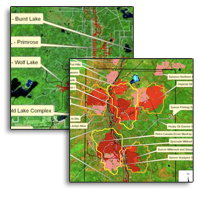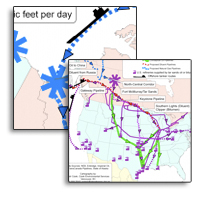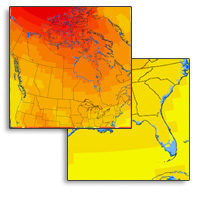Tar Sands 101
The Tar Sands "Gigaproject" is the largest industrial project in human history and likely also the most destructive. The tar sands mining procedure releases at least three times the CO2 emissions as regular oil production and is slated to become the single largest industrial contributor in North America to Climate Change.
The tar sands are already slated to be the cause of up to the second fastest rate of deforestation on the planet behind the Amazon Rainforest Basin. Currently approved projects will see 3 million barrels of tar sands mock crude produced daily by 2018; for each barrel of oil up to as high as five barrels of water are used.
Human health in many communities has seriously taken a turn for the worse with many causes alleged to be from tar sands production. Tar sands production has led to many serious social issues throughout Alberta, from housing crises to the vast expansion of temporary foreign worker programs that racialize and exploit so-called non-citizens. Infrastructure from pipelines to refineries to super tanker oil traffic on the seas crosses the continent in all directions to allthree major oceans and the Gulf of Mexico.
The mock oil produced primarily is consumed in the United States and helps to subsidize continued wars of aggression against other oil producing nations such as Iraq, Venezuela and Iran.
To understand the tar sands in more depth, continue to our Tar Sands 101 reading list
"Province blasted for not sticking up for tar sands"
Province blasted for not sticking up for oilsands
By MARKUS ERMISCH, SUN MEDIA
18th November 2009
Alberta's government and energy industry must step up their listless defence of the oilsands and better fund their PR battle against environmental groups, says the president of the Alberta Enterprise Group.
"If we're serious about defending this asset, we need to spend some money on it," Tim Shipton told an industry conference yesterday.
"I don't see enough effort being made to position this as Canada's energy project."
North American Energy Integration: An insider perspective
Pipelines, Energy, Economy
DEREK BURNEY
WEB | November 17, 2009
Shortly after 9/11, a senior US official approached the Canadian embassy in Washington to ask whom in Ottawa he should contact regarding shared strategic infrastructure, such as pipelines and electricity grids. Presumably Canada is today better equipped now than it seemed to have been then to cope with the threat, however minimal. In any event, the issue of pipeline security needs to be placed in the larger context of energy security and economic resilience.
Indigenous women to tour U.K. to raise tar sands awareness
Canadians tour U.K. to raise oilsands awareness
Last Updated: Sunday, November 15, 2009
CBC News
Three Canadian women hope to raise awareness in the U.K. about the oilsands, and inspire citizens to take action.Three Canadian women hope to raise awareness in the U.K. about the oilsands, and inspire citizens to take action. (CBC)
Three aboriginal women from Canada are visiting the United Kingdom and Ireland as part of a 10-day tour to raise awareness around human rights issues occurring in the Alberta tarsands.
Parks, a favourite PR cover for un-green things
Parks, a favourite PR cover for un-green things
By Peter Gorrie Environment Columnist
Published On Sat Nov 14 2009 // Toronto Star
MERIDA, Mexico–It was a rare sight: a hall full of environmentalists standing to applaud federal Environment Minister Jim Prentice.
Peak oil: what does the data say?
Peak oil: what does the data say?
Terry Macalister, Guardian, November 13, 2009
The controversy over the International Energy Agency (IEA) figures has highlighted the peak oil debate. What do the numbers say?
The question is not if the world is running out of oil, it's when. There are finite quantities of crude even if the oil companies get the chance to dig up the Arctic as they are desperate to do.
Too fearful to publicise peak oil reality
Too fearful to publicise peak oil reality
The economic establishment accepts the world soon won't be able to meet energy demands, but wants to keep quiet about it
o Madeleine Bunting
o guardian.co.uk, Tuesday 10 November 2009
Big tar sands players looking to solidify holdings by gobbling up smaller stakes
Big oilsands players looking to solidify holdings by gobbling up smaller stakes
By Lauren Krugel (CP) – November 11, 2009
CALGARY — Northern Alberta is a patchwork of motley oilsands properties, with some chunks controlled by energy heavyweights and others in the hands of smaller companies.
With virtually all of the premium morsels already spoken for, the map is expected change significantly as the bigger players consolidate their positions by gobbling up smaller holdings.
‘Peak oil’ closer than we think, says IEA mole
‘Peak oil’ closer than we think, says IEA mole
Oil gushes from a well
Whistleblower say phoney oil figures are being used to avoid panic on markets
By Edward Helmore
FIRST POSTED NOVEMBER 10, 2009
Despite the discovery of massive new, untapped reserves, the world is much
closer to running out of oil than official estimates show, claims a
whistleblower at the International Energy Agency in the /Guardian/.
The unnamed source claims the US has been deliberately underplaying any
potential shortage and, in effect, the IEA's annual Energy Outlook, expected to
Dr O'Connor Cleared once and for all!
Doctor who suggested oilsands-cancer link cleared of misconduct charge
By Florence Loyie, Canwest News Service
November 7, 2009
EDMONTON - An embattled family physician who raised concerns about a possible link between Alberta's oilsands and cancer rates in a remote aboriginal community received vindication this week when he was cleared of causing "undue alarm."
Dr. John O'Connor found himself in hot water after he claimed in 2003 and 2004 that residents of Fort Chipewyan, Alta., had unusually high rates of blood, colon, bile-duct and liver cancer.
Impacts of Pew Funding: What others are saying
Impacts of Pew Funding
What others are saying
from "Offsetting Resistance: The effects of foundation funding from the Great Bear Rainforest to the Athabasca River", a special report by Dru Oja Jay and Macdonald Stainsby. Released September, 2009.



